The Women's Movement at the Crossroads
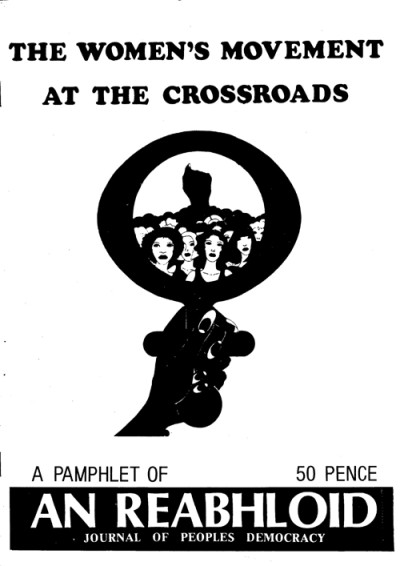
| Date: | 1987 c. |
|---|---|
| Organisation: | People's Democracy |
| Publication: | An Reabhloid |
| View: | View Document |
| Discuss: | Comments on this document |
| Subjects: |
Please note: The Irish Left Archive is provided as a non-commercial historical resource, open to all, and has reproduced this document as an accessible digital reference. Copyright remains with its original authors. If used on other sites, we would appreciate a link back and reference to The Irish Left Archive, in addition to the original creators. For re-publication, commercial, or other uses, please contact the original owners. If documents provided to The Irish Left Archive have been created for or added to other online archives, please inform us so sources can be credited.
Commentary From The Cedar Lounge Revolution
14th November 2011
This document, published as an An Reabhloid pamphlet, by Peoples Democracy concentrates on the issues facing the Women’s Movement in the latter part of the 1980s [and many thanks to Jim Monaghan for donating it to the Archive]. It notes that the situation is ‘enormously different to that of the early 60s and 70s. Then the women’s movement, along with the socialist, trade union and anti-imperialist movements, were very confident. Today all three are under attack, with a general shift ot the right in the political climate. Women have suffered the most attacks, a situation made easier by the demobilisation of the women’s movement North and South.
And it continues:
The fundamental questions of strategy which faced women in the early eighties are still burning questions today and… must be resolved through a period of discussion and debate involving the broad feminist movement and the anti-imperialist current.
The article itself is particularly interesting in detailing the ‘small but significant layer of socialists feminists in the early movement who, on paper, had a strong anti-imperialism, anti-partition stance’. And it attempts to emphasise the importance of linking those two elements with feminism. Here it pays particular attention to the Armagh Women Political Prisoners campaign ‘built by the Belfast Women Against Imperialism Group (WAI) in the late 1970s’.
Beyond the critique of other strands within feminism during this period what is also useful is the overview of a range of defeats and setbacks during that period, from the dismissal of teacher Eileen Flynn, the Joanne Hayes tribunal, ‘the rightwing campaign in the media against ‘unmarried mothers’ and drawing the net more widely ‘the anti-gay hysteria being orchestrated against persons with AIDs’. It also notes the ‘defeat of the divorce referendum and the SPUC campaign to shut down the abortion referral services of the women’s clinics’.
The document also has articles on ‘Fighting against the closedown of women’s clinics’ in the wake of the Justice Liam Hamilton High Court verdict which shut down pregnancy counselling services by Open Line and Well Women Centre. It also considers ‘Lessons from the Divorce Defeat’. And it argues that ‘this illustrates the power of the Catholic Church and the inability of bourgeois and reformist parties to tackle it. Far from confirming the appropriateness of partition the result reinforces the need to smash it’.
It also looks at ‘Development’s in the European Women’s Movement’. And it makes the interesting point that ‘the criminal failure of the labour movement to support women adequately produces much frustration among feminists about a ‘privileged men’s movement’ in the trade unions.
Here it also critiques ‘Right-wing governments and union leaders [who] are cynically exploiting this feminist resentment of the male-dominated world of work, arguing for a freeze on the wages of ‘high-paid’ workers. This strategy supported in Britain by the TUC and Eurocommunist influenced radical feminist, disastrously takes pressure off the capitalists and deepens divisions in the workers movement.
More from People's Democracy
People's Democracy in the archive
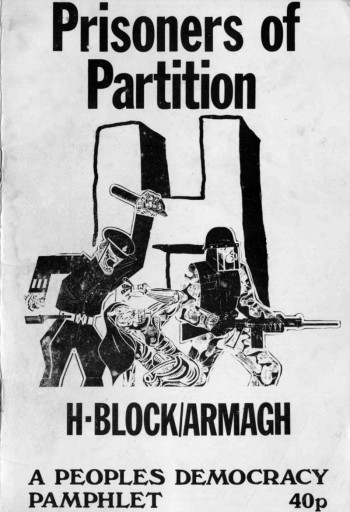
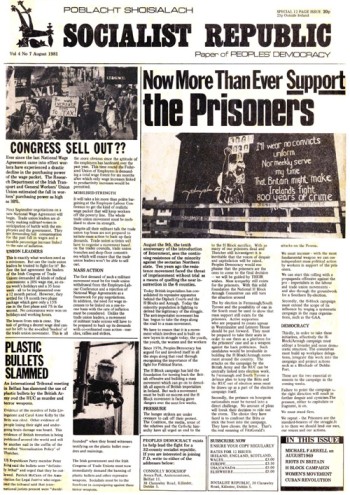
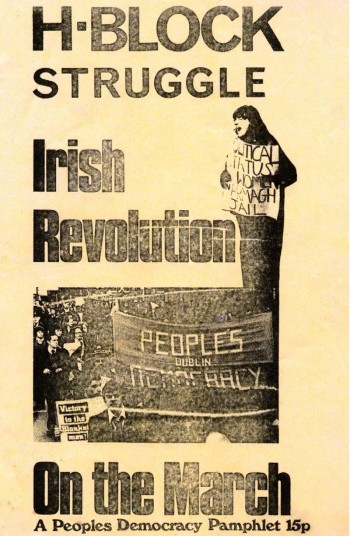
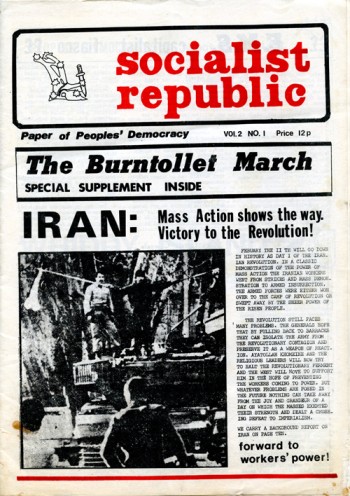
Comments
No Comments yet.
Add a Comment
Comments can be formatted in Markdown format . Use the toolbar to apply the correct syntax to your comment. The basic formats are:
**Bold text**
Bold text
_Italic text_
Italic text
[A link](http://www.example.com)
A link
You can join this discussion on The Cedar Lounge Revolution
By: WorldbyStorm Mon, 14 Nov 2011 18:19:54
In reply to Mark P.
Yeah, isn’t your point that it wasn’t a lot as an outcome given the centrality of the feminist movement… in a way though would it be perhaps fairer to say the cooption by parts of civil society than the state itself, though I agree that was part of the process too.
Reply on the CLR
By: Mark P Tue, 15 Nov 2011 02:48:19
In reply to Mark P.
The distinction between civil society and the state is a blurry one, particularly when huge chunks of civil society are funded by the state.
Reply on the CLR
By: WorldbyStorm Tue, 15 Nov 2011 07:46:25
In reply to Mark P.
All too true. But I’m not necessarily using the term ‘civil society’ in a positive way in this context. All too often ‘civil society’ seems to me to be the politer side of a supposedly anti-establishment attitude closely nestled in to the establishment.
Reply on the CLR
By: Mark P Tue, 15 Nov 2011 18:43:57
In reply to Mark P.
Fair point. I think I’m just used to people using the term “civil society” as if automatically connoted something good, as opposed to being a polite term for bodies funded by the state, or alternatively by the super-rich and their foundations.
Reply on the CLR
By: WorldbyStorm Tue, 15 Nov 2011 18:58:45
In reply to Mark P.
That’s it precisely. I think that’s why I’m so suspicious, not that it has to be bad, but that it’s taken as read by too many that it’s always good.
Reply on the CLR
By: Vier alte Broschüren « Entdinglichung Wed, 16 Nov 2011 09:41:32
[…] Peoples Democracy: The Women’s Movement at the Crossroads, An Reabhloid Pamphlet (1987/1988) auf Cedar Lounge […]
Reply on the CLR
By: Left Archive Index now updated to October 2012 to March 2012 – and some items of particular interest « The Cedar Lounge Revolution Mon, 09 Apr 2012 02:54:10
[…] Peoples’ Democracy collection saw the addition of The Women’s Movement at the Crossroads, An Reabhloid Pamphlet, from […]
Reply on the CLR